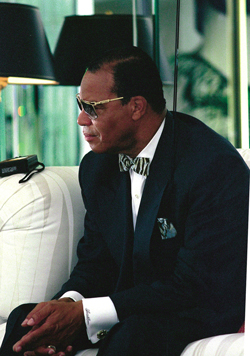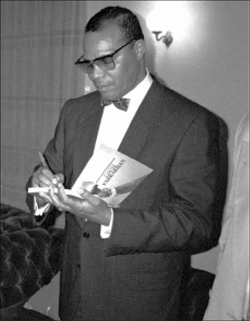JABRIL.MUHAMMAD

Prior to the departure of the Messiah, I had thought of writing certain items for his followers (and the public in general) in the following: a book of the articles written by the Honorable Elijah Muhammad; later, a defense of the Honorable Elijah Muhammad and then a history of the Nation of Islam. Those were my desires through the 1960s, which somewhat ended with the publication of This Is The One. Because of the fact, that all of what I had in mind for that book was not published, the desire for a fuller defense of him continued. So did the desire to write a history of the Nation of Islam.
I also had some specific subjects in my mind to write on before I wrote This Is The One. But I more or less put them to the back of my mind, until I published that book.
Then I went through a series of experiences that resulted in my being more alone or by myself than I ever experienced except earlier when I was sent to prison. That time period when I was “alone” was the time period during which Allah blessed me to write the book that I was to give to the Honorable Minister Louis Farrakhan in 1977. But all through that time, I continued to think on some certain subjects within the larger subject that dominated my thinking.
That which dominated my thinking, I believe can be best summed up in something that I said to the Honorable Elijah Muhammad, at dinner, either a few days before the end of April 1971, or the first day or so the next month.

I waited until the few who were there at dinner finished and left the dinner table leaving the Honorable Elijah Muhammad and I alone.
I took that opportunity to say the following to him: “Dear Holy Apostle, I know that there are many others there in Chicago, such as your family members and the laborers, who know you better than I. But I know that I know you better than millions and even billions throughout the earth. I know that I was not put in this position to show off or act big but to learn everything I could from you and about you to accurately pass it on to others.”
He said nothing in response. He just looked at me, with the very slightest hint of approval.
That is what I did, every day, from the time that I accepted him and his teachings, in 1954, up to that moment. That’s what I have tried to do ever since. This effort was to later include Minister Farrakhan–the man to whom the Honorable Elijah Muhammad said he wanted his mind. I’m a witness bearer that he has used and continues to use my Brother as a means of speaking to the rest of us, to the American government and people and to the rest of the world ever since he arose in 1977.
I’ve written all of the above as a sort of introduction of my purpose for writing that which follows, of specific memories that contains that which I hope will instruct and benefit others.
The specific memory I want to get to first–which occurred about 8 or 9 days before I entered prison–I believe can best be understood, or at least better understood, if I mention a few facts that were major factors leading to it.

Minister Philbert Omar took me to the home of the Honorable Elijah Muhammad for my first personal meeting with him. That was on July 1, 1956. I was working at the U.S. Postal Office at that time. Three days after that meeting, while at work, I read the following words from a vest pocket size copy of The Gospel of John the following: “The father judges no man but has committed all judgment to the son.”
Immediately, I recognized the man with whom I, and others just had dinner, just three days before, that he was made by God to be the judge of the world. I was stunned; happy; gratified, and very excited.
Five years later, I was blessed to be visiting him for two days in Phoenix, Arizona. That was in November 1961. I was getting my final answers from him for the Believers, who gave them to me, and for other issues that I can leave behind for the benefit of the Minister who was taking my place in the Bay Area.
One of the questions I asked the Honorable Elijah Muhammad was the following: “Dear Holy Apostle isn’t it true that when one is reading Psalms one is reading the heart of the last Messenger?”
He abruptly turned, shifting his entire body to his left, and clearly looked as if someone had gotten his attention. I was startled. I glanced at the direction in which he was looking. He was looking up at about a forty-five degree angle. I glanced back at him and again in the direction that which his attention was directed and back at him again.
He spoke words, a few of which I heard, which obviously were a reaction to someone’s words, which he heard that I (and the few others there) could not hear. Fleetingly I thought that he was communicating with Master Fard Muhammad. Fleetingly, I thought who else could have gotten his attention and would he have reacted to in the way that he did except Master Fard Muhammad?
I “knew” Master Fard Muhammad had heard my question and had spoke to His servant before he could respond to me. It all was a little too heavy for me.
Then he somewhat slowly turned back to his right, picked up his soup spoon, lifted some soup to his mouth, he glanced at me and said, “Yes Brother.”
I want to be able to state why I wrote the above, next article, Allah willing. That involves the history of the Nation of Islam.
More next issue, Allah willing.












